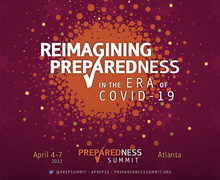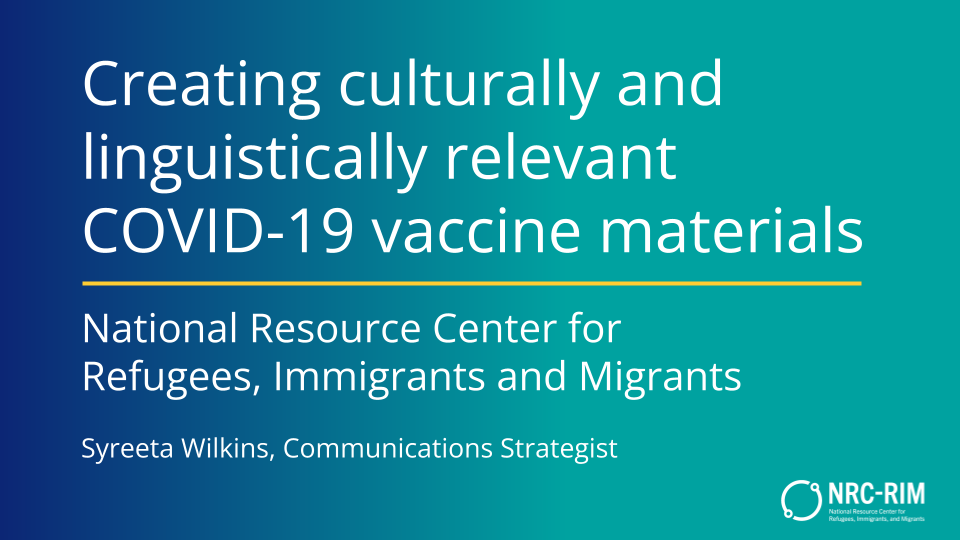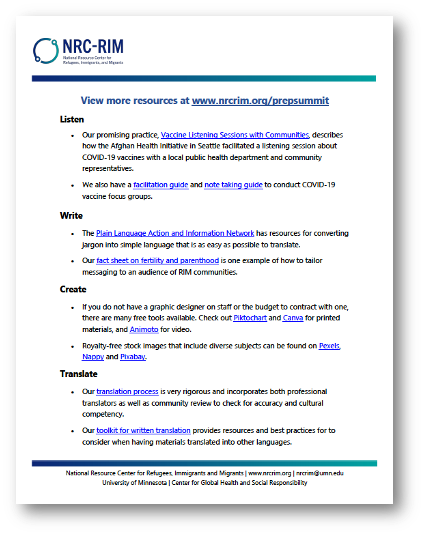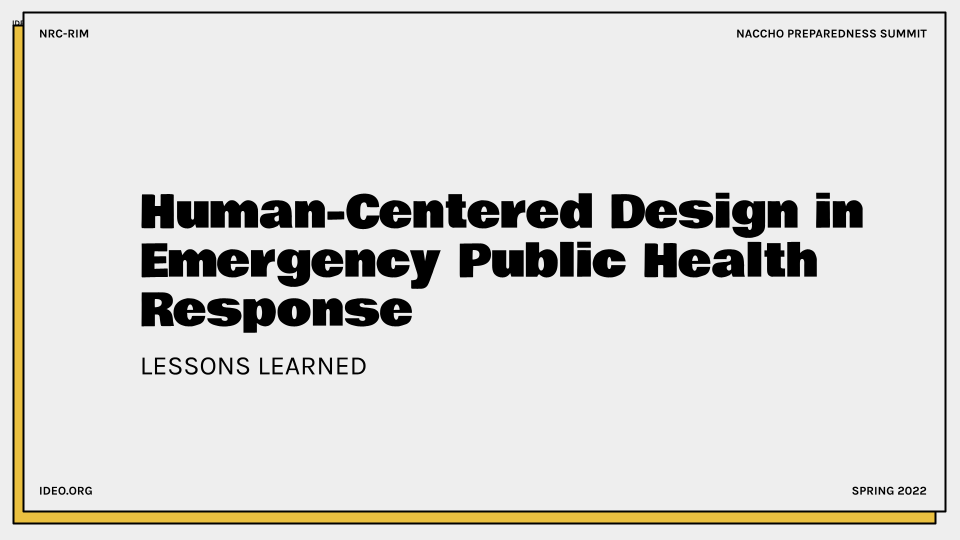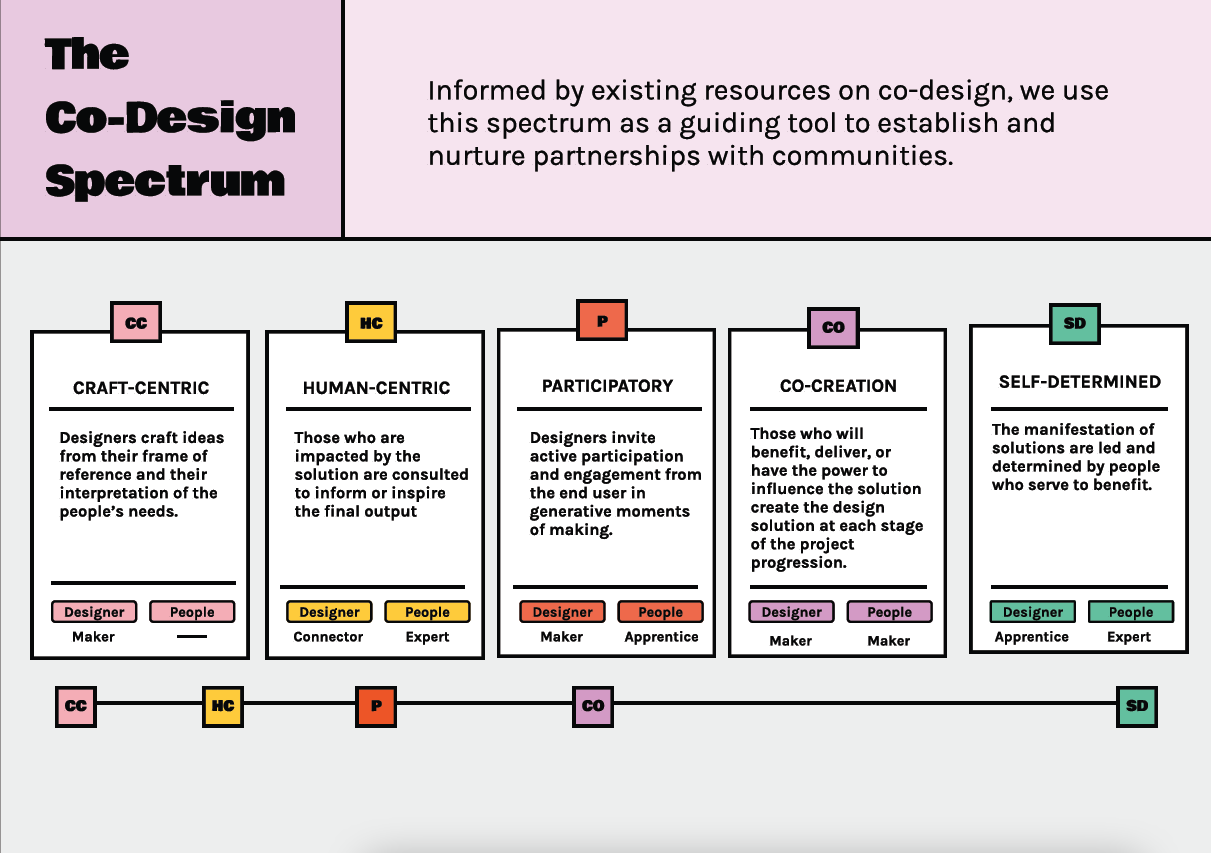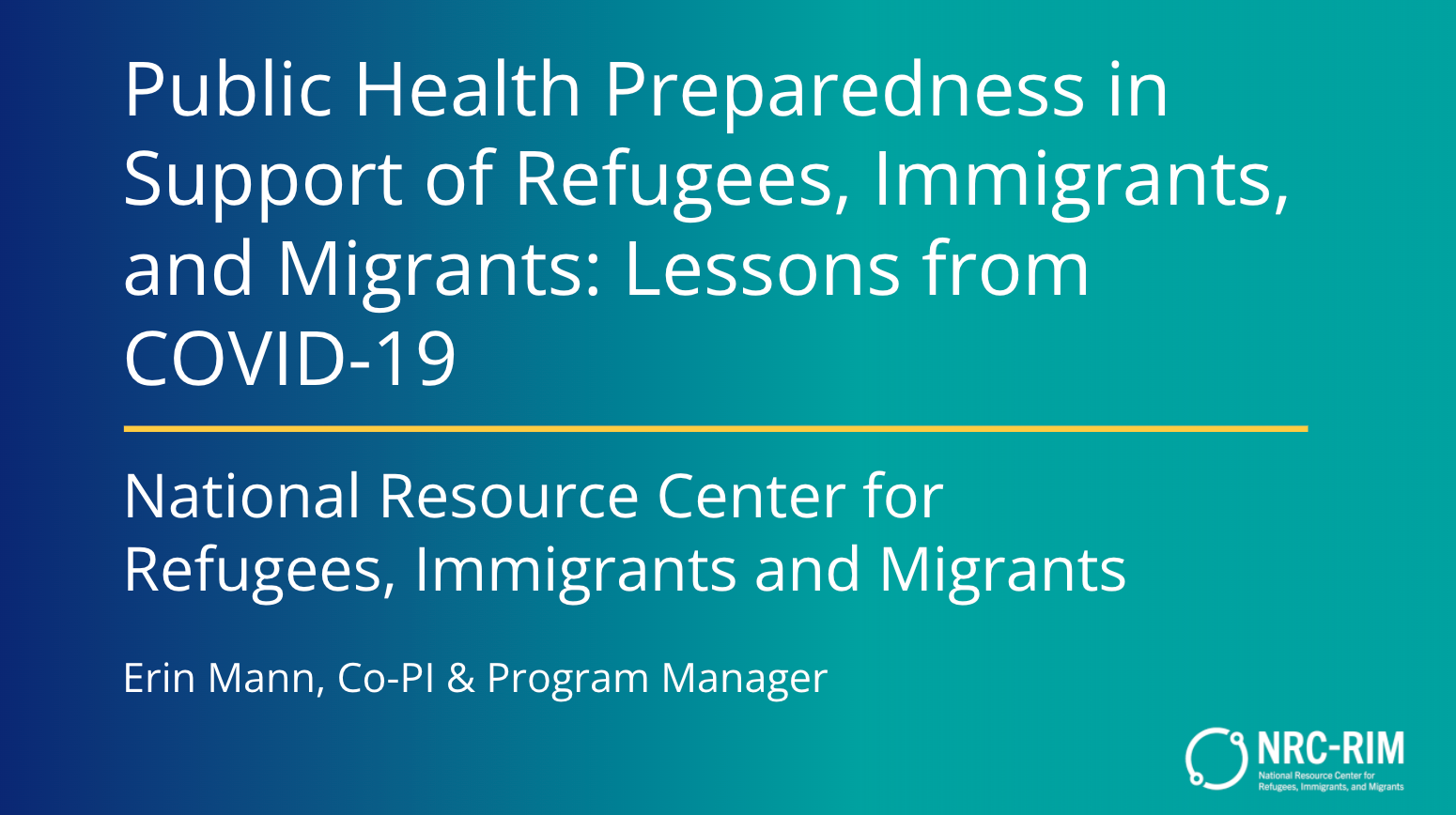
The NRC-RIM team will hold sessions at the 2022 Preparedness Summit in Atlanta, GA from April 4-7 on health communications and public health preparedness for refugee, immigrant and migrant communities.
The 2022 Preparedness Summit, Reimagining Preparedness in the Era of COVID-19, is an opportunity to reflect on lessons learned from current and previous public health responses, and highlight tools, resources, and learnings that will be relevant in the future.
Jump to:
Monday, April 4, 10:30 a.m. - 12 p.m.
Ensuring a high-quality health education and communications program that is culturally and linguistically relevant is necessary to improve health outcomes in refugee, immigrant and migrant communities. Join this session to explore communications strategies used during the COVID-19 pandemic that are relevant for future public health challenges.
Listen
- Promising Practice: Vaccine Listening Sessions with Communities
- Vaccine focus groups facilitation guide and note taking guide
Write
Design
Translate
- NRC-RIM translation process
- Toolkit: Written Translation
- Guide: Creating Effective Translations
- Checklist: Content Validation
Scale
- Conversation Guides
- Vaccine Campaigns: Get Vaccinated, Get the Facts, Vaccination Is
- Makespace
Other

Syreeta Wilkins, MA
Communications Strategist
slw@umn.edu | LinkedIn
Syreeta is the communications strategist for the National Resource Center for Refugees, Immigrants and Migrants (NRC-RIM), where she leads the communications efforts for the center as well as guides the creation and dissemination of health communications materials.
She has more than a decade of experience in strategic communications, specializing in internal communications, digital media, and diverse and multilingual communities. Before joining the team at NRC-RIM, she led communications for K-12 public schools, most recently focusing on crisis communications and other efforts related to her school district's COVID-19 response.
Syreeta holds a master’s degree in linguistics from New York University, where she explored socioeconomic influences on Spanish-speaking immigrants' speech patterns. She holds a bachelor’s degree from Macalester College.
The National Resource Center for Refugees, Immigrants, and Migrants (NRC-RIM) is funded by the CDC to support health departments and community organizations working with refugee, immigrant, and migrant communities that have been disproportionately affected by COVID-19. This disproportionality exists not because of any biological or genetic factor, but because of long-standing, systemic, health and social inequities. Ensuring a high-quality health education and communications program that is culturally and linguistically relevant is necessary to overcome these challenges and improve health outcomes in these communities.
COVID-19 surfaced challenges for both public health departments and the communities they serve, especially refugee, immigrant and migrant communities. The disproportionate impact of the pandemic for refugee, immigrant and migrant communities also revealed opportunities to consider fundamental changes to the way we communicate public health information by incorporating community engagement and diverse perspectives. Sustained community engagement in the development of public health information will support recovery, facilitate resilience and bolster preparedness for any public health challenge that may present in the future.
Participants will learn practical strategies for community engagement, resource creation, translation, content validation and design that center the needs and experiences of refugees, immigrants and migrants. It is through these strategies that any public health department or other organization can ensure that they are meeting the needs of people of all cultural backgrounds in the communities they serve. Participants will learn how to:
- Partner with community representatives on the content, format, and dissemination of health communications materials
- Incorporate diverse perspectives into the communication of guidelines released by the CDC and other public health authorities
- Use photography and design elements that honor people from many different linguistic and cultural communities
- Ensure their work is rigorously translated and validated by community members for both accuracy and cultural appropriateness.
- Scale their work so that partner organizations and health departments can have a consistent message and far-reaching impact.
Tuesday, April 5, 8:30 a.m. - 10 a.m.
Learn how IDEO.org and National Resource Center for Refugees, Immigrants, and Migrants (NRC-RIM) developed community-driven vaccine confidence messaging for RIM communities across the country, and reflections on how these efforts could inform future emergency public health response.

Ridhi Arun, MS | IDEO.org
ridhi@ideo.org | LinkedIn
As Program Manager at IDEO.org, Ridhi brings her experience in design program management and passion for refugee health and rights to support the development of community-led solutions for refugee, immigrant, and migrant communities related to COVID-19. Prior to IDEO.org, Ridhi worked with Partnerships for Trauma Recovery, a non-profit that provides mental health services for refugees and asylum-seekers who have resettled in the Bay Area.

Claudia Sosa Lazo, MBA | IDEO.org
claudia@ideo.org | LinkedIn
As a Business Design Lead at IDEO.org, Claudia blends tangibility with inspiration to help teams create meaningful solutions that scale, and leads the Vaccine Confidence program work with this lens. Claudia previously worked as Head of Design and Research at Wave Money, a fast-growing financial technology company based in Southeast Asia.

Syreeta Wilkins, MA | NRC-RIM
slw@umn.edu | LinkedIn
Syreeta is the communications strategist for the National Resource Center for Refugees, Immigrants and Migrants (NRC-RIM), where she leads the communications efforts for the center as well as guides the creation and dissemination of health communications materials. Before joining the team NRC-RIM, Syreeta spent more than a decade leading communications for K-12 public schools.
IDEO.org and the National Resource Center for Refugees, Immigrants, and Migrants partnered in October 2020 to develop human-centered, community-driven campaigns and services for refugee, immigrant, and migrant communities across the United States. These communities have often been disproportionately affected by systemic inequities in our social and health systems, and COVID-19 was no different–exacerbating historical burden on these communities. In an effort to directly address these inequities, over the course of a year, in direct partnership with community leaders, we have built two campaigns: Vaccination Is and No Judgment.
We heard from community leaders that myths and misconceptions were circulating widely within their communities, and that each community has specific needs. The Vaccination Is Campaign was built to address hyperlocal issues around the vaccine, and to design messaging and communication strategies that are unique to each community, and developed by community leaders themselves. For example, Vaccination Is materials created in Arabic were very resonant to the Iraqi community in Dallas, but may not have the same effect on the Egyptian community in Michigan. While communities may share a language, their needs and concerns are not monolithic. We found that creating campaigns within a local context adds credibility and specificity.
The No Judgment campaign was built for young people from refugee, immigrant, and migrant communities to inspire depolarized, non-judgmental conversations about the vaccine. We heard from young people that one-on-one conversations were the best way to engage with their peers, and they craved tools and information to better have these conversations.
The process of developing each campaign, and the surrounding tools inspired key learnings for groups serving these communities, and opportunities for Emergency Public Health Response that include: 1) Strategies and Tactics to Hear and Respond to Community Needs, 2) Methodologies for Building Community-Driven Messages, and 3) Successes and Failures in Launching and Scaling Targeted and Universal Messaging. During this session, we will share our process, outcomes, and learnings to inform future efforts around community co-design in public health messaging and communications, specifically how community-driven solutions can increase community resilience and health department responsiveness.
Thursday, April 7, 9 - 9:45 a.m.
This session will showcase the National Resource Center for Refugees, Immigrants, and Migrants, a CDC-funded initiative to support health departments and community organizations with COVID-19 response among RIM communities. The session will focus on tools and resources that can be leveraged for public health preparedness in support of RIM communities beyond COVID-19.
Toolkits, Guides, and Promising Practices
- Guide: Supporting and Co-Creating Meaningful Community Advisory Boards
- Tips for Health Departments: Identifying Community Partners
- Toolkit: Partnerships
- Toolkit: Employer Engagement
- Promising Practice: Culturally-Specific Vaccine Information Broadcasts
- Promising Practice: Community-Led Hotlines
- Promising Practice: Phone Trees to Facilitate Vaccine Access
- Promising Practice: Community Movie Night + Information Exchange
- Promising Practice: Facebook Live
Health Education and Health Communications
- Translated Materials Library
- Vaccine Campaigns: Get Vaccinated, Get the Facts, Vaccination Is
- CICT Campaigns
- Makespace
- Mothers x Mothers
Training
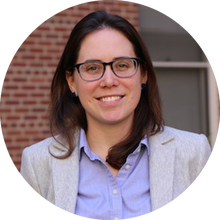
Erin Mann, MPH
Co-PI & Program Manager
mann0255@umn.edu | LinkedIn
Erin Mann, MPH, is the Program Manager and co-principal investigator for the National Resource Center for Refugees, Immigrants, and Migrants. Erin also serves as the Global Collaborations Coordinator for the Center for Global Health and Social Responsibility at the University of Minnesota where she manages a partnership between the University of Minnesota, the International Organization for Migration and the CDC.
Prior to these roles, Erin has managed global health and public health projects related to public health emergency preparedness and response, global medical supply chains, and bio-surveillance. Erin is passionate about global health and enjoys working on projects that foster long-lasting relationships with organizations and colleagues around the world.
Erin received her Master of Public Health from Boston University and her bachelor’s in International Studies from the University of Illinois.
More than 40 million people living in the United States were born in another country. This population is incredibly diverse representing many cultures, languages, regions of the world, as well as motivations for migration to the United States. While COVID-19 is a public health threat to the entire US population, the pandemic has disproportionately affected certain refugee, immigrant and migrant (RIM) communities.
Multiple factors have contributed to this disproportionate impact, including work environments that make social distancing challenging, biases against RIM communities, tenuous social and economic positions that make prevention and mitigation activities difficult, and barriers to healthcare access. Further, many RIM communities are often not involved or reflected in public health preparedness planning.
The success of COVID-19 interventions among these communities has required culturally-appropriate approaches that consider the unique strengths and needs of RIM communities and approaches that support genuine partnership between public health and communities. Learning from the successes and challenges of COVID-19 response among RIM communities is essential for enhancing resilience and recovery, and advancing health equity in future preparedness and response activities.
This session will showcase the work of the National Resource Center for Refugees, Immigrants, and Migrants (NRC-RIM), a CDC-funded initiative launched during the COVID-19 pandemic to support health departments and community organizations with COVID-19 response among RIM communities. NRC-RIM has collected, developed, and disseminated resources to improve COVID-19 prevention and mitigation activities among RIM communities, including best and promising practices, practical guides and checklists for health departments, self-paced online training, and translated health education and communications resources that can be customized by health departments and others.
Resources have covered multiple topics, including community engagement, health communications, case investigation and contact tracing, testing, vaccination, and multi-sector partnerships - all of which can be leveraged for future public health response activities. The resources were developed in partnership with public health departments or with community-based organizations and with guidance from the NRC-RIM Community Leadership Board. The session will focus on approaches, tools, and resources that are replicable and scalable and may be useful for addressing future public health challenges and emergencies among RIM communities.
